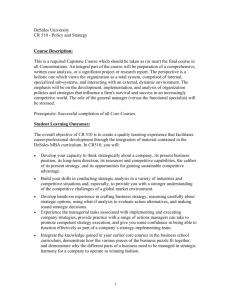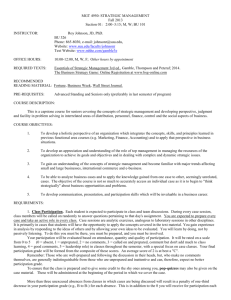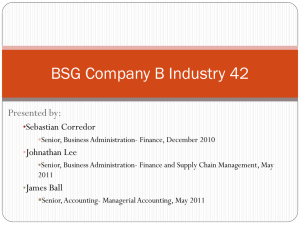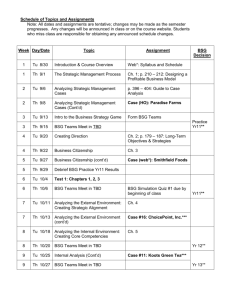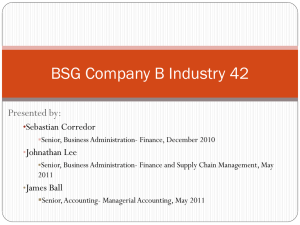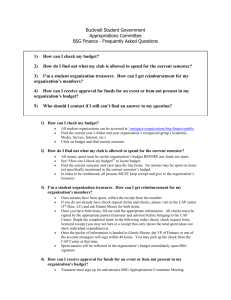bus-499-tchalian-03 - Martin V. Smith School of Business
advertisement
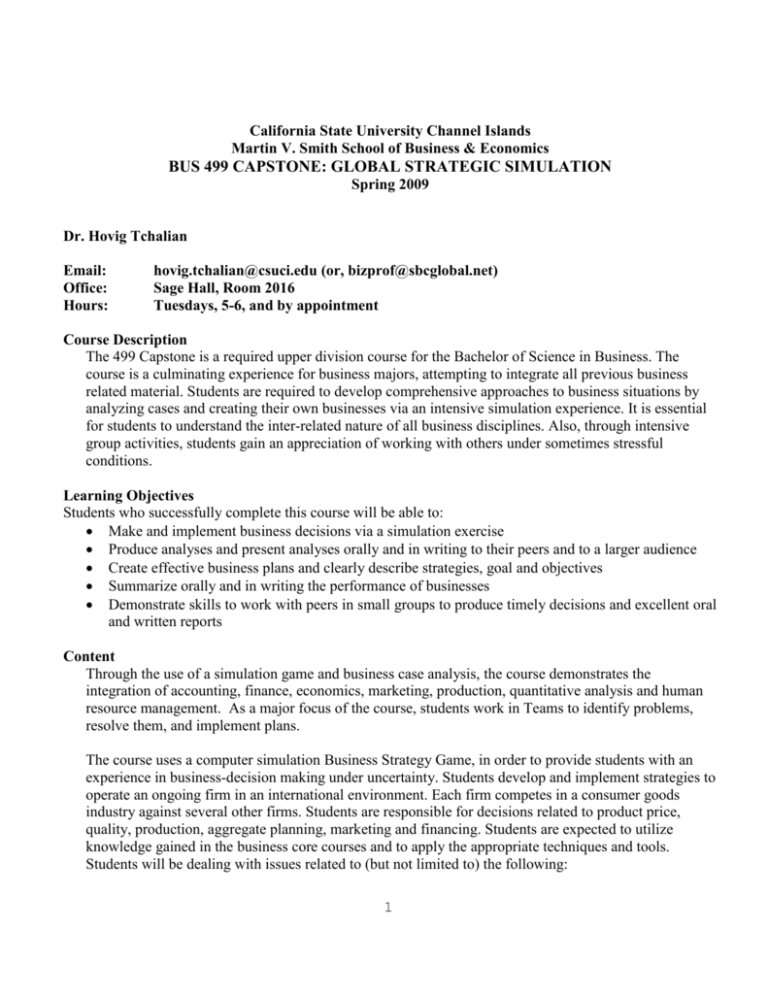
California State University Channel Islands Martin V. Smith School of Business & Economics BUS 499 CAPSTONE: GLOBAL STRATEGIC SIMULATION Spring 2009 Dr. Hovig Tchalian Email: Office: Hours: hovig.tchalian@csuci.edu (or, bizprof@sbcglobal.net) Sage Hall, Room 2016 Tuesdays, 5-6, and by appointment Course Description The 499 Capstone is a required upper division course for the Bachelor of Science in Business. The course is a culminating experience for business majors, attempting to integrate all previous business related material. Students are required to develop comprehensive approaches to business situations by analyzing cases and creating their own businesses via an intensive simulation experience. It is essential for students to understand the inter-related nature of all business disciplines. Also, through intensive group activities, students gain an appreciation of working with others under sometimes stressful conditions. Learning Objectives Students who successfully complete this course will be able to: Make and implement business decisions via a simulation exercise Produce analyses and present analyses orally and in writing to their peers and to a larger audience Create effective business plans and clearly describe strategies, goal and objectives Summarize orally and in writing the performance of businesses Demonstrate skills to work with peers in small groups to produce timely decisions and excellent oral and written reports Content Through the use of a simulation game and business case analysis, the course demonstrates the integration of accounting, finance, economics, marketing, production, quantitative analysis and human resource management. As a major focus of the course, students work in Teams to identify problems, resolve them, and implement plans. The course uses a computer simulation Business Strategy Game, in order to provide students with an experience in business-decision making under uncertainty. Students develop and implement strategies to operate an ongoing firm in an international environment. Each firm competes in a consumer goods industry against several other firms. Students are responsible for decisions related to product price, quality, production, aggregate planning, marketing and financing. Students are expected to utilize knowledge gained in the business core courses and to apply the appropriate techniques and tools. Students will be dealing with issues related to (but not limited to) the following: 1 Accounting: Finance Operations Management: Economics & Statistics: Management: Information Systems: Application and interpretation of accounting data. Ratio analysis, financial statements, and financial planning. Product line management, strategies of promotion, advertising and pricing, and analysis of the marketing environment. Aggregate production planning and production standards for quality, cost and quantity control. Statistical analysis and quantitative models including forecasting methods, and the economic environment. Planning, organization, motivation, and communication. Forecasting and financial simulation models. Texts Dess, Gregory G., Lumpkin, G. T. and Alan B. Eisner. Strategic Management: Text and Cases, 4th Ed. Boston: McGraw-Hill Irwin, 2008: ISBN 978-0-07-340498-1 The Business Strategy Game: A Global Simulation, 2009 Edition. http://www.bsg-online.com Recommended materials: Business Week, Fortune, The Wall Street Journal, The Economist Grading Weight Computer Simulation Game In-class exams from textbook and lecture (2 at 10% each) Written Case Briefs (3 at 5% each) Written Case Analysis/Update Final Case Analysis Attendance/Participation/Instructor Evaluation Total 35% 20% 15% 10% 10% 10% -----100% No Plus/Minus grading will be used in this course. The Business Strategy Game (35% of course grade) In the Business Strategy Game (BSG), class members are divided into teams and assigned to run an athletic footwear company in head-to-head competition against companies run by other class members. Companies compete in a global market arena, selling branded and private-label athletic footwear in four geographic regions—Europe-Africa, North America, Asia-Pacific, and Latin America. The computer simulation game allows students to apply previously learned concepts, skills and techniques in an international competitive and goal-oriented environment. Successful management of a firm requires a balanced emphasis among all functional areas. The game is a dynamic-interactive simulation. The effectiveness of team decisions rests both on the theoretical correctness of each simulated annual decision and on the competitive decisions of other teams. 2 The Game website is at: http://www.bsg-online.com. BSG Grading Quiz 1 Score (online) Quiz 2 Score (online) 3-year Strategic Plan (online) Game Score Final Presentation (each team member must present) Peer Evaluation (online) Weight 3% 7% 10% 60% 15% 5% -----Total 100% Exams (20% of course grade) There are two (non-cumulative) exams, which will consist of either multiple-choice or essay questions. The first exam will cover Chapters 1 to 4 and 13 of the textbook. The second exam will cover the remaining chapters. Case Briefs (3 at 5%, for a total of 15% of course grade) In all business capstone courses, a significant goal for each student is to develop an ability to analyze business cases. This activity consists of (1) evaluating an organization’s internal strengths and weaknesses, (2) identifying external opportunities and threats faced by the organization, (3) suggesting viable strategic and tactical moves open to the organization, and (4) recommending and justifying an implementation plan for the firm. A very important skill to develop is an ability to identify the key strategic issue that an organization must address to be successful in the future. In this class, we will discuss nine cases. For each case discussion, you should prepare a case brief, the format of which will be provided in a separate document. In essence, a case brief provides a short analysis of an organization’s internal and external environment, pinpoints the key strategic issue faced by the firm, and proposes and justifies the best course of action for the firm to address its key strategic issue. You will submit three written case briefs during the semester, the length of which should be between two to three pages, double-spaced, typed, with 12-point Times Roman font and 1-inch margins. Briefs of less than two pages usually provide an insufficient analysis, while those longer than three pages usually contain too much detail. Case Analyses (2 at 10%, for a total of 20% of course grade) In this course, in addition to the case briefs, you will submit two detailed case analysis documents. A case analysis provides a more comprehensive analysis of the internal and external environment, proposes three potential solutions to resolve the key strategic issue, and offers one recommended solution with detailed justification. The length of each case analysis should be between seven and ten pages, double-spaced, typed, with 12-point Times Roman font and 1-inch margins. The first analysis 3 will address the case of Ford Motor Company. You are to make a recommendation to the Ford Board of Directors at the end of the case, as you normally would in a case brief. After you make your recommendation, you will update the case as of the due date by doing online library research. That is, what specific actions did Ford undertake from early 2007 through early 2009? In this analysis, your update must include at least five references and should be of approximately three to five pages in length. Thus, your total detailed case analysis including update should be between ten and fifteen pages in length. The second case analysis will not require an update and will be due at the time of the final. Attendance, Class Participation and Instructor Evaluation (10% of course grade) In a seminar class such as this, the success of the class, the enjoyment of each student, and the degree of material learned is highly dependent on classroom participation. To that end, attendance will be taken at the beginning of each class. Students who do not stay for the entire class session will be marked absent. Your preparation for class discussion will be considered, as well as the extent and quality of your contribution. If it appears that the class is not adequately prepared to discuss a case, the professor may require that written case briefs be prepared and submitted prior to class. Assessment of Learning The Martin V. Smith School of Business and Economics is dedicated to continuous assessment of student learning and success. In this class, the following objectives will be assessed: Oral Presentation Skills – based on your final game presentation. Written Work – based on your Ford Motor update case analysis. Critical Thinking – based on your Ford Motor update case analysis. Collaboration – based on your team skills evidenced during the Business Simulation Game. Specifics of these assessments will be provided in a separate document. Your scores on the assessment activity will not contribute to your grade in the course. Team members evaluate each other's contribution (including their own) to the Team effort. Your professor will provide further instructions and will provide a form for this evaluation. 4 Business Strategy Game (BSG) Schedule All decisions are to be submitted online by 4:59 pm on the decision due dates. No exceptions will be allowed, and teams that do not submit decisions will be penalized severely. WEEK 4 7 7 8 8 9 9 10 10 DAY Tue. Tue. Sat. Wed. Sat. Wed. Sat. Wed. Sat. DATE 2/10 3/3 ACTIVITY Review BSG and form teams BSG Orientation lecture in class 3/7 BSG Team meetings in class Submit Y11 Practice Decision 3/11 3/14 3/18 3/21 Complete online individual QUIZ 1 Submit Y11 Decision Submit Y12 Decision Submit Y13 Decision Submit Y14 Decision 4/1 4/4 Complete online individual QUIZ 2 Submit Y15 Decision Submit Y16 Decision Submit 3-year Strategic Plan 11 11 12 12 13 15 Finals Wed. Sat. Wed. Sat. Wed. Tue. Tue. 4/8 4/11 4/15 4/18 4/22 Complete online interim peer evaluation form Submit Y17 Decision Submit Y18 Decision Submit Y19 Decision Submit Y20 Decision Submit Y21 Decision 5/5 5/12 Complete online final peer evaluation form BSG Team meetings in class 7:00pm – 10:00pm: BSG Team presentations in class Class Schedule – T, 7:00 pm - 9:50 pm *This schedule is subject to change during the semester* 5 Class Discussion Strategic Management Text Reading Ch. 1 The External Environment Ch. 2 The Internal Environment Case Analysis Ch. 3 Ch. 13 Robin Hood Case 1 2/10 The Casino Industry Intellectual Assets Case 25 Ch. 4 5 2/17 BSG Overview and Team Formation EXAM 1 (Chs. 1-4, 13) 6 2/24 Wk 1 Date 1/20 2 1/27 3 4 7 8 9 Written Assignment 2/3 Case Brief Walmart 3/3 Business-Level Strategy Walmart Ch. 5 Case 31 Corporate-Level Strategy Researching a company using online resources Ch. 6 BSG online QUIZ 1 by Sat. 3/10 Case 30 3/17 International Strategy eBay Ch. 7 Case 29 Entrepreneurship and Strategy Ch. 8 3/24 10 Start research for Ford Update case - due 5/5 BSG discussion and BSG team meetings Apple Inc. Case Brief eBay 3/31 Notes BSG online QUIZ 2 by Tue. Spring Break - NO CLASS BSG team meetings BSG 3-year plan by Sat. 6 11 4/7 12 4/14 13 4/21 14 4/28 15 5/5 Strategic Control and Corporate Governance Ch. 9 The Skeleton in the Corporate Closet Strategic Leadership Case 3 Best-Laid Incentive Plans Innovation and Entrepreneurship Case 4 Ch. 12 Ch. 11 Case Brief Fresh Direct Fresh Direct Case 32 Case Analysis Course Review and prep for Exam 2 EXAM 2 (Chs. 5-9, 11,12) Ford Motor Company Receive Final Case for Analysis Case 38 Update Ford Motors BSG Team Meetings 16 5/12 Final Case Analysis TBD BSG Final Presentations 7
